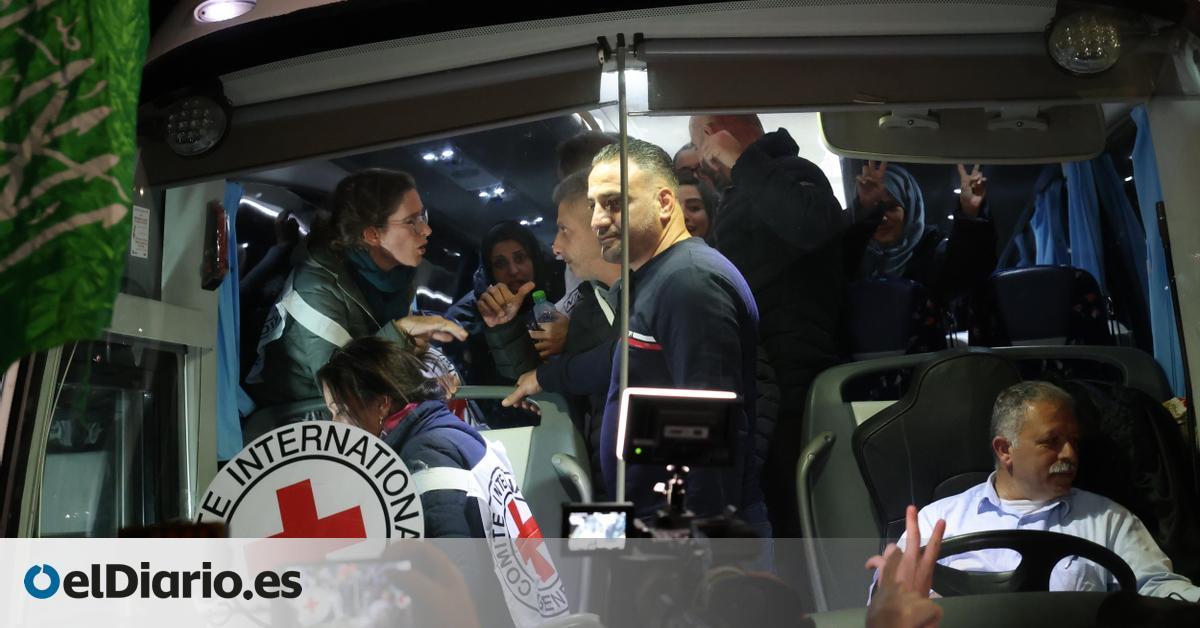
There will be a second extension of the truce in the Gaza Strip that began last Friday, which, during these six days, has stopped the until then incessant bombings and has allowed the release of nearly 90 Israeli and foreign hostages and 200 Palestinian prisoners.
Israel unanimously decided last night that if a list was not delivered before 7 a.m. — in Spain, 6 a.m. — “as agreed in the initial plan,” the attacks would resume “immediately.” Finally, this Thursday Israel received the list: “Israel recently received a list of women and children in accordance with the terms of the agreement and, therefore, the truce will continue,” the statement says.
At the stroke of midnight and while negotiations continued, Hamas freed ten Israeli hostages, in addition to four Thais, and a few hours earlier it had handed over two Russian-Israeli women to the Red Cross under a parallel agreement with the Russian leader. , Vladimir Putin. Israeli authorities freed 30 Palestinians, 15 women and 15 teenagers.
Among those released Wednesday is prominent Palestinian activist Ahed Tamimi, 22, who rose to fame for slapping an Israeli soldier when she was still a child. Tamimi was arrested about three weeks ago by Israel on charges of “inciting terrorism,” according to Hebrew media, for a post on Instagram.

Ahed Tamimi, a #Palestinian activist and a former prisoner, after her release in the sixth batch of the #Gaza-truce swap deal. pic.twitter.com/6uEIkjfXFi
— Wafa News Agency – English (@WAFANewsEnglish) November 30, 2023
Qatar, Egypt and the United States have mediated between Hamas and Israel for an extension of the ceasefire period that was due to end on Thursday morning after having been extended on Monday for two more days. The director of the CIA, William Burns, the head of the Israeli Mossad, David Barnea, and, according to the EFE agency, the head of Egyptian Intelligence, Abbas Kamel, met in Doha to explore the options of achieving an extension and a new phase with the release of hostages, men or Israeli soldiers, according to the Reuters agency, which reports that “what could be necessary to reach a ceasefire that lasts more than a few days” was also addressed.
Israel has shown itself open to prolonging the truce as long as Hamas releases ten hostages a day. But the deal in place until now only entailed the release of civilian women and children, and with fewer people now in captivity, one question was whether an extension might mean agreeing to terms governing the release of at least some Israeli men for the first time. .
Despite the additional extension of the ceasefire, Israel has insisted at all times that, once more hostages are freed, it will attack Gaza again until it achieves its objective: ending Hamas. “The Israeli Army is prepared to continue fighting, and we take advantage of the days of pause to learn” and “approve future operational plans,” Chief of Staff Herzi Halevi said this Tuesday, adding that “the dismantling of Hamas will continue.” .
This Wednesday, Israel’s ambassador to the UN, Gilad Erdan, rejected calls for a permanent ceasefire in Gaza because that would lead to “the continuation of Hamas’ reign of terror,” adding that the group is not “a reliable partner.” for peace.” In the same forum, the Palestinian Foreign Minister, Riad al Malki, has denounced that Israel is erasing the Palestinians “from history and geography” and has called for “international protection and action.”
For now, the international community has intervened to promote the extension of the ceasefire, which has given respite to the inhabitants of Gaza, where more than 15,000 people died during the month of October and until November 23, according to the count of the Gazan government, controlled by Hamas.
More releases
Hamas released another 10 Israeli hostages this Wednesday along with four Thai citizens, as confirmed by the Israeli Army after 11 p.m. local time. Their release had been delayed for several hours due to “technical problems,” but they were finally handed over to the Red Cross to be later transferred to Israel. Qatari sources cited by the newspaper ‘The Guardian’ claim that they are five women and five children. Five of the hostages also have dual nationality of Israel and the Netherlands, Germany and the United States.
Hours earlier, the Palestinian militia had released two Russian hostages, “in response to the efforts of Russian President Vladimir Putin,” who join another citizen with dual Russian-Israeli nationality who was handed over on Sunday, also in “ recognition of the Russian position in support of the Palestinian cause,” according to the Islamist group itself. Israel has confirmed that the two freed women have been handed over to the Army by the Red Cross and that they are two women, identified as Lena Trupanov and her mother Irena Tatti, and according to the local press they would have dual citizenship.
The release of the foreign hostages has been obtained in parallel with the negotiations for the exchange of Israeli hostages for Palestinian prisoners, which is part of the ceasefire agreement. Under that agreement, Hamas has freed a total of 68 Israeli and 21 foreign hostages and Israel has released 210 Palestinians from its prisons, all women and children on both sides.
Also this Wednesday, the armed wing of Hamas announced the death of the youngest hostage in its hands, the ten-month-old baby Kfir Bibas, along with his four-year-old brother Ariel, and their mother. Shiri Silverman Bibas, who would have died in “bombings prior to” the truce. However, the Israeli military has not confirmed this information and has said it is still verifying its accuracy. In a statement, he noted that the Bibas family were kidnapped alive and taken to Gaza on October 7, during the assault by Hamas militiamen on communities in southern Israel, in which they killed some 1,200 people and kidnapped more than 200.
Just yesterday, the baby’s paternal aunt had regretted that he had not been included in the list of freed hostages, despite being the youngest and needing special care: “All the other children have already been freed. We don’t know where they are being held. They keep them underground. There is not much baby food and all this makes us very worried about a four year old and a 10 month old baby who still needs formula milk as his main diet. We know nothing about his condition,” declared Ofri Bibas, according to EFE.
On Tuesday, on the fifth day of the truce, Palestinian militias released 12 hostages in the Strip and Israeli authorities freed 30 Palestinians. Ten Israeli hostages – all women – and two Thais were freed and transferred to Israel via Egypt, followed by the release of 15 Palestinian women and 15 minors from Israeli prisons, as part of the exchange of captives for prisoners, a key element of the agreement between Hamas and Israel.
As is usual, the Gaza hostages left through the Rafah crossing with Egypt and then entered Israeli territory, while the Palestinians were transferred from various Israeli prisons to the Ofer prison and the Jerusalem detention center, and from There they were released to the West Bank or the eastern part of Jerusalem.
Humanitarian aid
Gazans have taken advantage of the cessation of fighting to see the extensive devastation of the enclave, where it is estimated that there are still 6,500 people missing under the rubble and some 250,000 families have been left homeless after Israeli attacks caused material damage to some 300,000 homes. of the enclave (50,000 completely destroyed and another 250,000 partially destroyed), according to data from local authorities.
At the same time, the Government of Gaza has continued to warn of the serious humanitarian crisis in the enclave caused by the almost total Israeli siege that vetoed access to food, water, fuel or medical supplies during some 50 days of war, which is still causing electricity outages due to lack of gasoline for generators.

This shortage began to alleviate after the access of two hundred trucks with humanitarian aid daily since Friday, but according to the Gazan authorities and the UN it is not enough to meet the basic needs of the 2.3 million Gazans. Humanitarian organizations have called for the immediate reopening of more border crossings, apart from the Egyptian Rafah crossing, through which all shipments of humanitarian aid and supplies, as well as the few medical teams or humanitarian workers, have entered.
This Tuesday, an aid convoy from the Palestinian Red Crescent carrying food, medical supplies, water and non-food items arrived in the areas located in the north of the strip, which had been practically isolated from the rest of the enclave. However, most of the aid distribution during the day took place in southern areas, where the vast majority of internally displaced people are located, according to the United Nations.
Added to the humanitarian catastrophe is the arrival of winter and the rains, so not having fuel for electricity will be another added challenge as temperatures drop.
Source: www.eldiario.es

